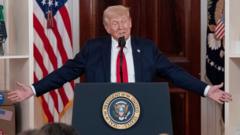As the US grapples with its first economic contraction in three years, President Trump has appealed for understanding from business executives, claiming that the recent downturn is temporary and the result of prior administration policies.
Trump Requests More Time on Economic Recovery as Contraction Sparks Concerns

Trump Requests More Time on Economic Recovery as Contraction Sparks Concerns
President Trump attributes recent economic decline to prior administration policies, urging patience from business leaders.
In a meeting with business leaders at the White House, Trump addressed the contraction of the US economy, which the Commerce Department reported at an annual rate of 0.3%. This decline follows a growth rate of 2.4% in the preceding quarter, raising alarm about potential recession. Despite the setback, Trump stated that $8 trillion in promised investments could turn the tide for American manufacturing, emphasizing that imports were stockpiled before tariffs were imposed.
"It's Biden's economy because we took over on January 20th," Trump asserted, insisting that more time is needed to rectify the situation. His comments were met with criticism from Democratic lawmakers, with House Minority Leader Hakeem Jeffries labeling it "Trump's failed economy."
During the event, Trump highlighted supposed forthcoming investments in critical sectors such as technology and healthcare and introduced executives from prominent companies. He also called for Congress to approve his tax bill, which faces bipartisan resistance.
Earlier in the day, Trump attempted to assuage concerns about potential shortages of goods, downplaying the issue as a matter of reduced quantity rather than availability, stating that children might have fewer toys but at a slightly higher cost.
In addressing the ongoing trade war, Trump maintained his stance on tariffs, which have adversely impacted trade relations with China, prompting retaliatory measures from Beijing. With tariffs on various international imports in place, the administration's trade policies continue to be a source of contention.
As President Trump marks his first 100 days in office, the struggle for economic stability amidst shifting political landscapes raises questions about the future direction of US economic policy.
"It's Biden's economy because we took over on January 20th," Trump asserted, insisting that more time is needed to rectify the situation. His comments were met with criticism from Democratic lawmakers, with House Minority Leader Hakeem Jeffries labeling it "Trump's failed economy."
During the event, Trump highlighted supposed forthcoming investments in critical sectors such as technology and healthcare and introduced executives from prominent companies. He also called for Congress to approve his tax bill, which faces bipartisan resistance.
Earlier in the day, Trump attempted to assuage concerns about potential shortages of goods, downplaying the issue as a matter of reduced quantity rather than availability, stating that children might have fewer toys but at a slightly higher cost.
In addressing the ongoing trade war, Trump maintained his stance on tariffs, which have adversely impacted trade relations with China, prompting retaliatory measures from Beijing. With tariffs on various international imports in place, the administration's trade policies continue to be a source of contention.
As President Trump marks his first 100 days in office, the struggle for economic stability amidst shifting political landscapes raises questions about the future direction of US economic policy.




















